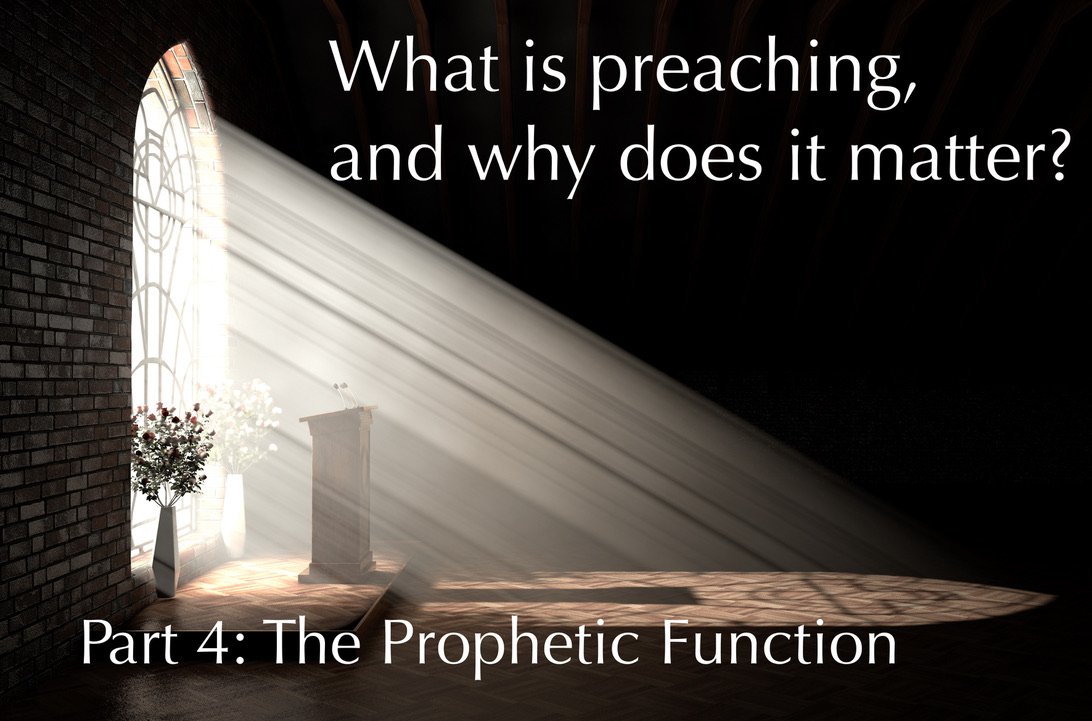Preaching Names Our Brokenness
The Preacher as Prophet
A migrant worker, far from home, stands surrounded by a crowd of well-dressed strangers. He can only assume they are at best apathetic and at worst hostile to him and to the message he has come to deliver. He can feel them bristle as he comes clean in his opening lines: he has come to speak the words of the living God, who roars judgment – not from Samaria, but from the rival capital beyond their borders.
The tension softens slightly as he gets into the substance of his message. He turns his weather-worn face to the northwest and says, “This is what the Lord says: ‘For three sins of Damascus, even for four I will not relent ….’” He names the sin of their most bitter enemy and pronounces judgment. Well, they can’t object to that! Then he turns around to face southeast and continues, “For three sins of Gaza, even for four ….” One by one, he calls out their enemies and rivals -- Tyre in the northwest, Edom in the south, Ammon in the East, Moab in the southeast.
Excitement builds as he repeats the pattern of judgement: “This what the Lord says … this is how they have offended him … this is the terrible way he will punish them … the Lord has spoken.” By now, the crowd is captivated by the rhythm of his words. Are they aware that he is setting them up? Probably not. More likely, they don’t suspect that this shepherd fig-picker from Tekoa is capable of such a sophisticated rhetorical strategy. When he turns southward again and pronounces judgment on his own homeland of Judah, they applaud his self-awareness and objectivity. They feel vindicated for their rebellion and secession from the tribal federation, justified in their smug self-righteousness. As it turns out, they conclude, they were right all along. God is on their side. They really are the true sons of Israel.
Then the other shoe falls. The prophet Amos (see Amos 1-2) finally reveals the real reason he’s here. “This is what the Lord says, ‘For three sins of Israel, even for four, I will not relent.’” He uses the same formula he has used seven times already, with one exception. In all the previous pronouncements, though he has mentioned four sins, he has only named one. In the case of Israel, his audience, he itemizes the whole list:
They sell the innocent for silver …
They trample on the heads of the poor …
Father and son use the same girl …
They lie down beside every altar …
This is the prophetic function of preaching: naming our brokenness. Peeling back the layers of our denial, our deflection, and our self-deception to give a name to the self-destructive inclination of our hands, our heads, and our hearts. Why does this matter? Because only when our rebellion is named can we repent of it. And only when we repent can we experience redemption. And only through redemption can we enjoy restoration. Naming our brokenness is the at the trailhead to the only possible path to wholeness, healing, and grace.
The personal reality of sin.
Eugene Peterson called pastors to see their people as “unwell in a new way.”[1] This means we see them in theological and not therapeutic terms. They are sinners. This is not an assessment of their manners or their morals, or where they fit on the spectrum of good to evil. The fact that they are sinners means there is something fundamentally and irreparably wrong between them and God. “Sinner” is not our score. It is our condition.
People prefer to see themselves in moral terms. We are flawed, deficient, and bull-headed. The choices we make are a mix of good and bad – maybe mostly bad. We tend to hurt ourselves and others. We constantly disappoint ourselves with our poor performance and lackluster achievements. But if we could just get some better advice, make some better choices, build some better habits, all could be well. We’re just one good decision away from being on the right path.
One of the preacher’s jobs is to dispel this myth. We are sinners by nature and by choice. The sooner we give up on our ability to save ourselves, the sooner we can be ready to encounter our only hope: the grace of God in Jesus.
The corporate reach of sin.
But it’s not just ourselves we need to give up on. We also need to stop looking for solutions in the world around us. As Isaiah stood before God, he was stricken by his desperate reality: “I am a man of unclean lips, and I live among a people of unclean lips!” This means my neighbor, my friend, my co-worker – even my pastor is no better off than I am. Our institutions, our leaders, even creation itself is infected with the same disease. Our collective sin casts a shadow on every corner of our society and culture
Again, our hearers will often live in denial on this point. We still look hopefully to a therapist, a doctor, a scientist, or a president to show us the way to health. We convince ourselves (all evidence to the contrary) that if we can just pull together and collaborate better, we can solve this thing. We can fix what ails us. We can create a more just world.
In the face of these delusions, the preacher stands to tell the truth. All our collective efforts at reform amount to rearranging deckchairs on the Titanic. We might be able to tidy up a bit, but the ship is still sinking. Our society doesn’t need reform. We need rescue.
The pervasive essence of sin.
At the heart of the problem is a flawed understanding of the essence of sin. We read the account of Adam and Eve in the garden with eyes focused on the forbidden fruit. We speculate that, if they had just left the tree of knowledge alone, the story would have been so different. If only they had abided by the one rule God had given them, the world would be a better place.
This kind of thinking misses the real point of Genesis 3. The essence of sin is not seen in the rule that was broken, but in the temptation itself. The serpent didn’t appeal to Eve’s hidden desire to break a rule, or even to her appetite for a tasty fruit. The real temptation was in the promise that she would be like God.
“Sins” can variously be described as missing the mark, transgressing the law, violating a relationship, knowing what is right to do and not doing it. But “sin” at its core is always idolatry. We desire to be our own gods, and we can only do so by rebelling against the one who actually is God.
Preaching matters because as God’s people gather around his word proclaimed there is the real possibility of naming our brokenness. God’s word will always confront us at the point of our idolatry. When his light is shed on our sin, we are in the place where we can receive the Good News of his grace.
[1] Eugene Peterson, The Contemplative Pastor: Returning to the Art of Spiritual Direction, 117-128.


